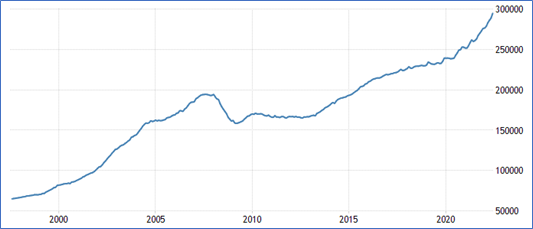In nearly all my discussions with clients, the subject of property comes up.
Often, it’ll specifically relate to a particular action – you’re thinking of buying or selling your home, or even just toying with the idea.
Occasionally the conversation will move on to the possibility of putting together a property portfolio in the UK to create an income stream there while you’re still based in Hong Kong.
Sometimes it’s less tangible than that, consisting of a general discussion around property markets in Hong Kong and the UK.
Given all this, I thought it was worth devoting an article to the overarching subject of property and sharing with you some of my thoughts and observations, based on my experiences as a planner.
1. The security of home-ownership provides valuable peace of mind
It’s easy to see why buying property as an investment seems to be a default position for many.
The expression “an Englishman’s home is his castle” dates back to the 1600s and captures the idea of your home as a place of refuge. More recently though – particularly in the last 50 years – it’s come to epitomise the idea of owning your own home, appealing to a sense of aspiration and “getting on”.
It still carries some of the original meaning too, with the implication that by owning your own home you aren’t subject to the whims of a landlord.
Recently, you’ve enjoyed a period of historically low interest rates. Over a 13-year period from March 2009 to earlier this year, the Bank of England (BoE) base rate was below 1%.
That has very much helped reinforce the view that a mortgage loan is “good” debt as opposed to the “bad” debt of unsecured borrowing.
Then, subject to effective estate planning, your property is an asset that you can pass on to your family when you die.
2. Property can be a long-term appreciating asset
It’s very likely the case that your family and friends, including siblings and parents, have generally done well through the rise in value of the property market over the years.
As you can see from the chart below, UK property prices have increased more than threefold in the last 25 years.

Source: Trading Economics citing Halifax figures
Unlike an investment portfolio, which does rely – to an extent – on review, analysis, and some investment expertise – buying a property is a relatively simple exercise. It’s a one-off event rather than an ongoing series of transactions.
So, the increase in the value of property may not be down to shrewd investment decisions. Instead, it’s based on the fact that property is, literally, a bricks-and-mortar asset and so produces real returns and typically goes up in value as inflation occurs.
Of course, buying a property that has renovation potential or is in an up-and-coming area may help deliver returns above the national average.
Having said all that, it’s worth bearing in mind that property is only an appreciable asset when you come to sell.
3. Property purchase is a uniquely leveraged transaction
For most of us, buying a property is a leveraged transaction.
You’ll borrow a proportion of the purchase price from a bank or other lender, and you’ll only need to provide a small proportion of the price in cash as part of the buying process.
For example, if you buy a property valued at £250,000 you may need to provide as little as £25,000 to £50,000 as a deposit.
If that property doubles in value to £500,000 over a 10-year period, then not only has the value of your asset doubled, but – based on your deposit outlay – you’ve actually gained a 1,000% increase based on your deposit (less taxes, expenses and interest).
I think it’s fair to say that not many people achieve that kind of return when investing in the stock market! Likewise, not many people leverage their stock market exposure!
4. Liquidity is a double-edged sword
When there is an economic downturn, it’s rarely reflected immediately in the property market. Sellers tend to stick with the notion of putting their property on the market for the value it was before a recession hit. Additionally, the conventional house-selling process usually means you’re looking at anywhere between three to six months with no hiccups in order to sell a property. The owner of a mortgage brokerage we know well told me last week that they are experiencing 1 in 3 transactions failing at present.
But the delay avoids some of the potential pitfalls of the panic-selling often seen in stock markets.
I often like to use the example that if you bought a house for £250,000 and the economy goes through a rocky patch, and then someone were to knock on your door and offer you £200,000 for it, you would give them the shortest of shrifts.
However, it’s the complete opposite of this in the stock market. Selling during a market downturn to avoid any further losses is common. The illiquid nature of the housing market prevents that kind of irrational decision-making.
Against that, if you’re investing in property, it’s important you’re aware that there’ll be a delay when you come to sell. Furthermore, if you’re an investor who takes profits and leaves the initial capital investment intact, the only way that is feasible is by remortgaging up to, say, 75% of the property value.
5. There are pros and cons to owning a property portfolio
It’s undeniable that the unique nature of the property market can make a residential property portfolio a potentially attractive option.
The idea of owning a string of buy-to-let properties providing a regular income stream can, on the face of it, seem appealing.
Even if you aren’t prepared to go to that extent, simply letting out your UK property as an expat until such a time as you return to the UK can also have its attractions.
But you should bear in mind the potential pitfalls of such steps.
For one thing, it’s hardly a passive income. It’s very paperwork-intensive with endless financial and administration issues – accentuated each time you add a property to your portfolio.
Then there will be endless requests from tenants to replace the dishwasher, fix the boiler and repaint that patch of wall where the damp is. All of these happened to me this year at various points.
On top of that, there’s the potential headache of financing your properties, especially with a potential recession looming and the likelihood of the BoE raising the cost of borrowing in order to keep inflation in check.
Finally, being 6,000 miles away in Hong Kong clearly creates an additional level of potential complexity.
To summarise my position, I like property as an asset class but I like the idea of diversification more.
Get in touch
If you have any queries regarding your UK property, then please get in touch.
You can contact us by email or, if you prefer to speak to us, you can reach us in the UK on +44 (0) 208 0044900 or in Hong Kong on +852 39039004.




 Production
Production